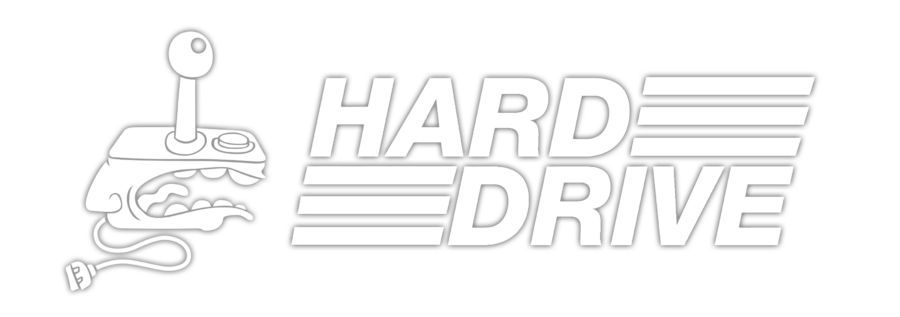The reign of the Nintendo 64 is emblematic of the mid to late ‘90s, an era remembered for what it produced while it was preoccupied with looking ahead. Most video games of the time were unapologetic about pushing 3D graphics forward, even if it wasn’t a fully realized concept yet. Meanwhile, as a society, we were worried sick about what Y2K might do to our computers while so obsessed with the upcoming millennium that roughly half of all media produced in 1999 had a ‘2000’ at the end of the title. They even gave the guy that made The X-Files some other show based entirely on how fucked up it was that the millennium was approaching. With the notable exception of one child screaming about the Nintendo 64 he’d received as a Christmas gift, we were too focused on the future to enjoy the present.
The irony here is that many of the things society was obsessing over later became a blip on the radar. Y2K was a bust, and as of this writing, none of the three dozen prominent streaming services currently feature Chris Carter’s Millenium (67 episodes across three seasons). Yet we all know GoldenEye, Mario 64, and Knife Edge: Nose Gunner!
Okay, maybe not Knife Edge: Nose Gunner.
The Nintendo 64 is many things to many people, probably more so than other consoles. To some, it was the gateway to a new, fully realized world of possibilities, in-depth adventures, and precision controls. To others, it’s overrated nostalgia, home to lifeless worlds the player often struggled to navigate thanks to that wonky controller and frequent camera issues. As always, the truth lies somewhere in the middle. With 296 games released in North America, its library is somewhat scarce compared to other similarly beloved consoles. Yet despite this, a half dozen titles routinely mentioned among the finest in gaming are found in its catalog. Rightfully, these and a handful of others have been discussed throughout the years as variations of “The Best 25 Nintendo 64 Games of All Time” lists permeate the internet.
We here at Hard Drive have never seen a party we didn’t want to invite ourselves to, but we also wanted to shine a light on the games that haven’t been endlessly ranked and re-ranked over the subsequent 25 years. We wanted to pay homage to both the stone-cold classics of the era (meaning the wrestling games with Steve Austin on the cover) and the outliers, the dubious games given as well-intentioned gifts by aunts and stepparents. These ghastly licensed titles and inexplicable originals often shaped our collective gaming experiences as much as anything else. And even if we say some pretty mean things, we just really love video games, man. It beats talking about anything else.
So here you go; all 296 North American Nintendo 64 games ranked and reviewed, as well as way too many references to our fathers, video stores, and 9/11. We hope you enjoy reading it — it’s the biggest thing we’ve ever done (not that it will impress our dads).
— Mark Roebuck
List by: Chris Colman, Patrick Crooks, John Danek, Chandler Dean, Kyle Duggan, Seth Finkelstein, Luca Fisher, Ryan Fleishman, Jeremy Kaplowitz, Michael Katz, James Knapp, Naomi Krause, Walker MacDonald, Ashley Oh, Kevin Podas, Gabe Porter, William Quant, Mark Roebuck, Matt Saincome, Joe Tilleli, Brad Waters, Thomas Wilde, and a guy who is stuck in a hole.
Art by Matt Harding
# 296. Batman Beyond: Return of the Joker
December 13, 2000
Kemco
Ubisoft
$65.99 on Amazon
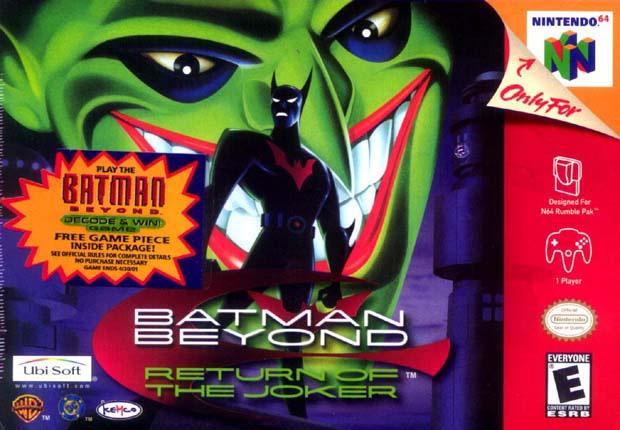
A devastatingly bad brawler that’s as devoid of redeeming qualities as Bruce Wayne is parents. Batman Beyond: Return of the Joker suffers from lightning quick animations that make it seem like Terry Batman is moving faster than the camera can keep up with, which is frustrating but also kind of hilarious. Batman’s move set mostly consists of kicking and punching, and several strikes can be strung together to form “combos” in the way that eating a bowl of barbecue sauce at 6:30 PM could loosely be considered “eating supper.” The game consists of five levels, and the score consists of five notes. The cinematics in between levels literally go by too fast to keep up with, which is probably a good thing, as I’m assuming this game’s story is as insulting as every other aspect of it. One of my favorite examples is that level two, Wayne Enterprises Building, is the exact same as level one, The Gotham Air & Space Museum, except the hallways have potted plants in them now. On the bright side, it’s all over in about an hour. It’s fucked up that this is the only Batman game they made for the Nintendo 64, because it really sucks. — Mark Roebuck
#295. Carmageddon 64
July 26, 2000
Stainless Games/Software Creations
Titus Interactive
$124.99 on Amazon

Somewhere, someone is going through an actual car crash, doomed to have to go through physical therapy for the next two years as a result of their injuries to have some semblance of their full range of motion back, on top of an unholy amount of medical debt. And that person would still be having more fun than me playing this abomination of a racing game. I was hoping that this game’s infamy was some kind of hyperbole; that perhaps people were harsher on it in its time and that modern days may have actually vindicated it like some of these other old games we played. But no. This one is just as dreadful as everyone says it is.
Besides creeping to the framerate of a slideshow on basically every turn, nothing works the way it’s supposed to and it all just feels like ass. The worst part is there’s no point to any of it! The game presents itself as some kind of apocalyptic race where you must ‘race or die’ as the opening narration spells out, but your only objective is to complete the race. No other racer is competing against you and yet you’re prompted to kill all other drivers you see. Also, there’s zombies everywhere as some sort of alternate win condition that is impossible to complete. And if I don’t want to destroy or maim anything in your apocalyptic demolition derby race, then what’s the point of it all? — William Quant
#294. Superman: The New Superman Adventures
May 31, 1999
Titus Interactive
$25.49 on Amazon
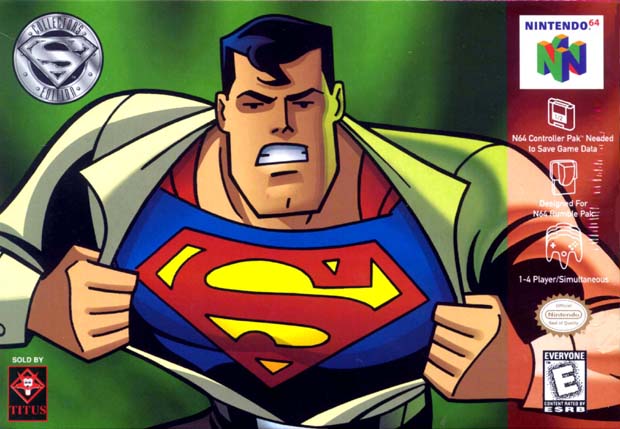
Look, you don’t need me to tell you this game sucks. We all know it sucks. It’s not even the developer’s fault that it sucks (the licensing team at WB hated the devs and tried to make them turn this into a SimCity clone). The controls suck. The gameplay sucks. The graphics suck. You don’t really do Superman things, you just do minigames all day with extremely strict time limits. Did you know you get to fight Darkseid in this game? He’s in a hallway. They’re all in hallways in this game! You know what? That’s enough. I’m going to spend the rest of this review begging someone, anyone, to make a Superman game. I don’t want to hear anything about how he’s too powerful and no one can hurt him. Figure it out! Have him fight Titano, the giant robot ape. Hey, and while we’re at it, let’s make another Incredible Hulk: Ultimate Destruction. You can make car boxing gloves in that. Man, what a fun game that was. — Seth Finkelstein
#293: B.I.O.F.R.E.A.K.S.
May 19, 1998
Midway
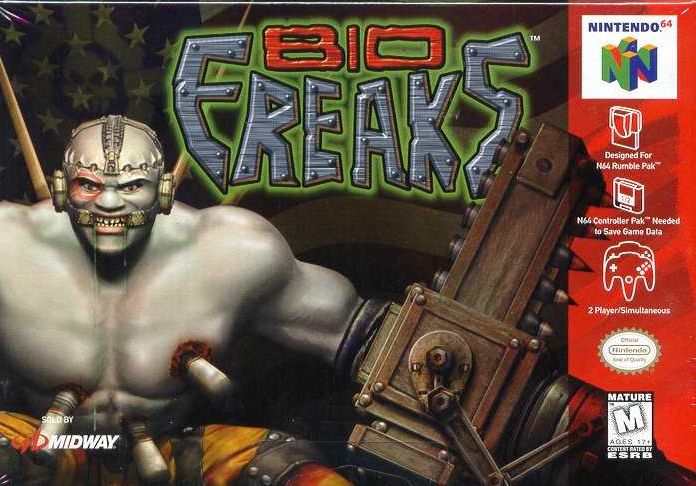
B.I.O.F.R.E.A.K.S. is a travesty. This fighting game is set in Neo Amerika, where escalating tech overlords have caused the nation to break down in the Techno-Industrial Civil War (great naming convention, really nailed it). Every character is a variant of unholy cyborg abomination named something like KillFucker because of how much they like Killing and Fucking. Honestly, B.I.O.F.R.E.A.K.S. would be a The Room, so-bad-it’s-good type game if the name of the flagship character on the cover wasn’t a racial slur used as a play on words (he has an actual zipper on his head, so funny). This checks out since the game as a whole feels targeted towards your dipshit cousin that still says the f-slur.
In terms of actual gameplay, B.I.O.F.R.E.A.K.S. characters control like a Walmart mobility scooter. The game is comically unbalanced, mainly due to a shield mechanic that makes characters invulnerable by removing all the textures on their already-ugly polygons. The game also blatantly cheats by reading your inputs so the computer enemies can easily beat all your attacks, which is why you can find multiple videos of content creators hopelessly trying to beat the BS final boss of Arcade Mode. The next time you want to complain about modern fighting games, pop in B.I.O.F.R.E.A.K.S. and thank god you’re getting another Street Fighter sequel instead of this roadkill. — Ryan Fleishman
#292. Monster Truck Madness 64
August 31, 1996
Terminal Reality
Microsoft
$37.99 on Amazon

Monster Truck Madness 64, Rockstar’s third release, long before they created Grand Theft Auto and Red Dead Redemption, opens with a caffeine-addled announcer screaming “ARE YOU READY?!” followed by a dick-crushing industrial metal track, so it’s clearly among the best games ever conceived. But alas, no amount of personality and testosterone can compensate for messy gameplay.
MTM 64 is both slippery and heavy, like trying to deadlift a sea lion. Or, in this case, like trying to push a monster truck with tires made of butter across a track made of soap. One must imagine their opponents laughing as their truck keels over into the mud on its side, a metaphor for life’s inevitable cruelty.
There is also a distinct lack of car-crushing — a crushing disappointment in its own right. Battering fences and tombstones is fun, but it doesn’t compare to the raw, primal thrill of man-hicular vehicle-slaughter that monster trucks bring to mind. And unlike the game’s trucks and corny announcer, the environments are almost entirely devoid of personality and largely identical to one another. Even the stage called DEATH TRAP was pretty nonlethal. I was expecting both DEATH and a host of booby TRAPs, or perhaps wild bears for flavor, but found neither.
Like Sisyphus making sweet love to the boulder that binds him in eternal punishment, I mindlessly chased an ever-returning ball (or puck) in the identical Soccer and Hockey minigames. Through all of it, the emcee’s commentary helped me to stay strong — he was there for me in each of these miserable game modes, even as I slipped all over the place and ate the dirt. My fondest memory of this game will be the exact moment I hurtled into an enemy vehicle in Summit Rumble, prompting the emcee, my only friend in this wasteland, to shout “Hell hath no fury like a monster truck scorned!” — Luca Fisher
#291. Rugrats in Paris: The Movie
November 8, 2000
Avalanche Software
THQ
$21.24 on Amazon
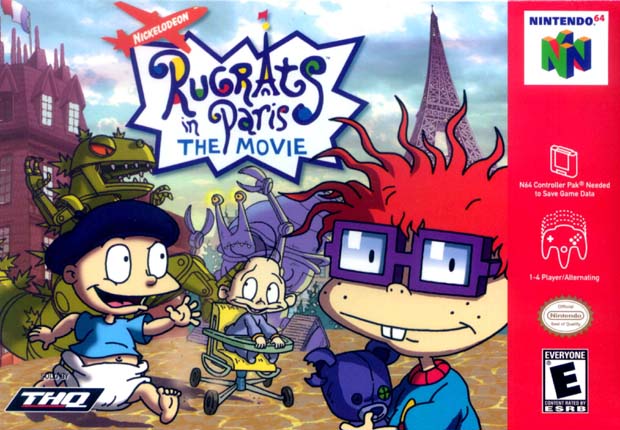
Rugrats in Paris is a beautiful kids movie that made me confront the grief of what it’s like to have lost a parent and learn how to welcome new familial love into your life. The video game adaptation of the film explores different thesis surrounding how I wish everyone around me was dead. It opens with selecting your favorite baby and then lets you explore its theme park overworld in a manner not unlike pushing a stroller without wheels. They seriously gave these babies tank controls. They cannot turn. The babies can only move forward, leaning slightly toward one direction or the other, and require stopping to turn and walk backwards at a crawl. If the dev’s goal was for me to re-experience learning to walk for the first time, well then I guess they succeeded.
The gameplay is structured as a series of carnival minigames so you can win enough tickets to buy the helmet that controls Reptar—then fight his arch-nemesis, RoboSnail. I never got to RoboSnail. These minigames range from a clunky ‘hit the targets with a baseball’ game where the hitboxes are incomprehensible to an almost-serviceable minigolf course that would maybe work if you didn’t have to run your baby from your previous stroke to the next with the same overworld tank controls that make me feel glad the vibrant orange and greens of Nickelodeon Studios in Orlando, Florida, have been painted over beige and its presence erased from the earth. — Joe Tilleli
#290. Armorines: Project S.W.A.R.M.
December 9, 1999
Acclaim Studios London
Acclaim
$26.99 on Amazon
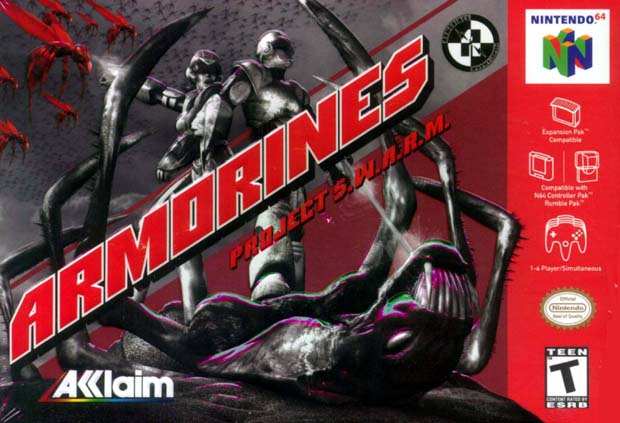
When I began Armorines: Project S.W.A.R.M., I was greeted with a cheesy B-movie style plot of alien invaders. I thought it would be good for a few laughs. Unfortunately, the game ended up laughing at me. I couldn’t move for the first few minutes of gameplay, only to learn that you move with the C-buttons, which is just as confusing and difficult as you’d imagine. Also, you cannot see anything in this game. You just keep barreling headfirst into darkness, hoping that the horrible bug enemies that you are unable to aim at for more than a second aren’t about to kill you. The worst part, however, is when you finish a level, only to be told you didn’t do one of the obtuse missions, leading to an instant game over and you needing to redo everything. And I still am completely lost as to what the fuck an Armorine is. — Gabe Porter
#289. NBA In The Zone ‘98
February 16, 1998
Konami
$22.49 on Amazon
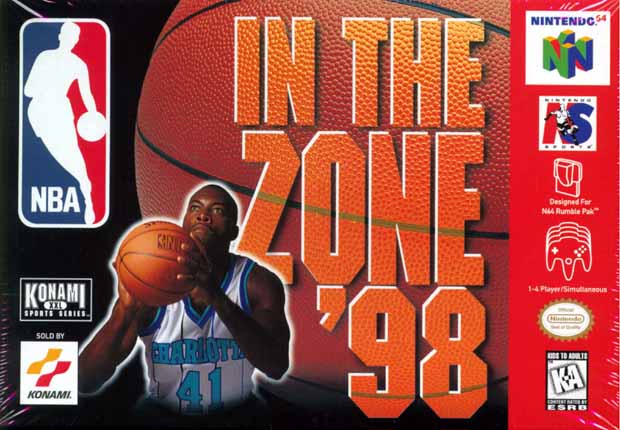
This is one of those games where the graphics aren’t so much ‘weird but forgivable demonstration of growing pains in three dimensional graphics’ as they are ‘vaguely humanoid creatures made up of uneven shoulders and blurry textures who’s every movement and action invoke unease and terror.’ Nothing about this game looks, sounds, or feels good. Factor that in with weird features like the ability to trade players in the pre-game setup menu (I think these guys are dressed for the game already, fellas) and omissions like the ability to call plays, you have the worst basketball game on the Nintendo 64. Anyone that’s played Fox Sports College Hoops ‘99 knows I’m talking mad shit right now. — M. Roebuck
#288: South Park Rally
January 5, 2000
Tantalus Interactive
Acclaim Entertainment
$99.99 on Amazon
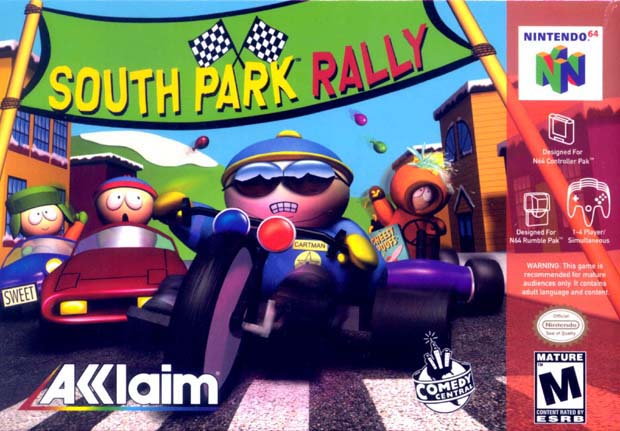
I wanted to go to bat for this game. I consistently saw it toward the top of every ‘Worst N64 Games’ list—and that puzzled me. I thought, “Shouldn’t even a middling kart racer be worth playing if it means I get to enjoy some irreverent South Park vibes in the process? Shouldn’t the fun of PLAYABLE CHEF alone be enough to get this thing to a 6/10!?”
And sure enough, when I started navigating the menu—with fart noises accompanying my every click—I had reason to hope. Between a full 3D rendition of the iconic theme song (complete with obligatory Kenny death) and a surprisingly wide array of playable characters, I dared to ask myself: for Acclaim Entertainment’s South Park games, could the third time have been the charm?
Then I started playing it. And I came to realize that in other racing games, we often fail to appreciate how wonderful it is to know where you are supposed to be going and how you are supposed to get there. Instead of simply circling around a set path, South Park Rally is one of very few racing games to embrace FromSoftware-style open world hostility; you’re free to go wherever you want, but you’re fucked if you don’t take one highly specific route. Other things we’ve taken for granted? Controls that work, sound that’s audible, AI that’s beatable, and most of all: a game that’s playable. South Park Rally succeeds only as an exercise in cynicism. Acclaim took this beloved franchise, chopped it up, fed it to us, and licked up our tears. Jesus Christ, dude. — Chandler Dean
#287. Deadly Arts
September 29, 1998
Konami
$64.99 on Amazon
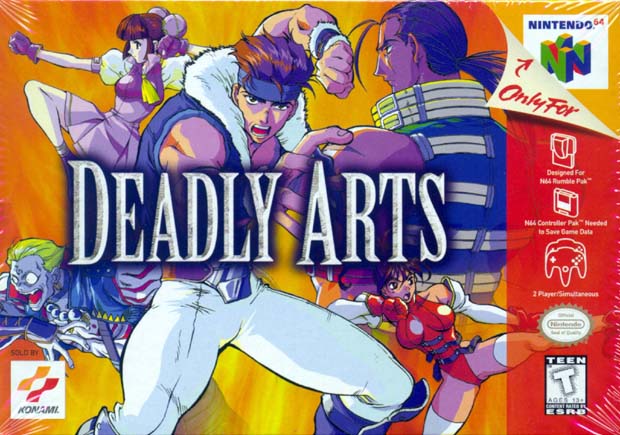
Deadly Arts may be the most authentic fighting game ever created, given how its shit show mechanics force it to so closely match the pace of most fights that occur in real life.
I started working on this review by inviting over my unemployed friend Tad, and we drank fourteen Michelob Ultras each to prepare. As the first round of martial combat began, we were amped and ready to have at it. We smack-talked and boasted about how badly we were going to beat one another. At one point we just straight up started spitting at each other. Then, some time later, the first awkward punch finally landed thanks to the absolutely appalling frame rate in the game. It was at this time that Tad threw down his controller and quit, no longer wanting to be a part of this painful and pointless exercise. I’d rather go watch the fights outside of Shady McGrady’s at 2 AM on a Sunday. — James Knapp
#286. ECW Hardcore Revolution
February 17, 2000
Acclaim
$40 on Amazon
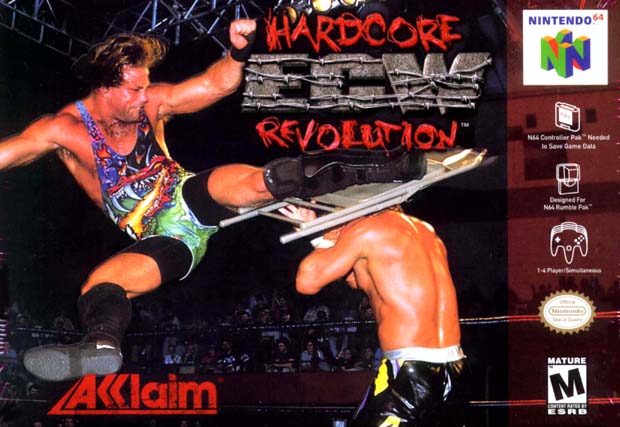
Since some Hard Drive readers might not be wrestling fans, let me spin you a yarn. In the same year this game came out, ECW – which stood for Extreme Championship Wrestling and was famed for their no holds barred, car crash style of wrestling – put on a Pay-Pew-View show called Living Dangerously that was also sponsored by Acclaim and this very game. At this event, a wrestler named New Jack, famous for being an absolute legitimate psychopath, dragged another wrestler to the top of a scaffolding to perform an unplanned stunt that resulted in them both crashing 20 feet unprotected onto a concrete arena floor. They both survived, but not without injuries and for New Jack, not without losing a fuckton of vision in one eye. Watching this horrific accident unfold was still a more enjoyable experience than playing ECW Hardcore Revolution. — W. Quant
Next Page
